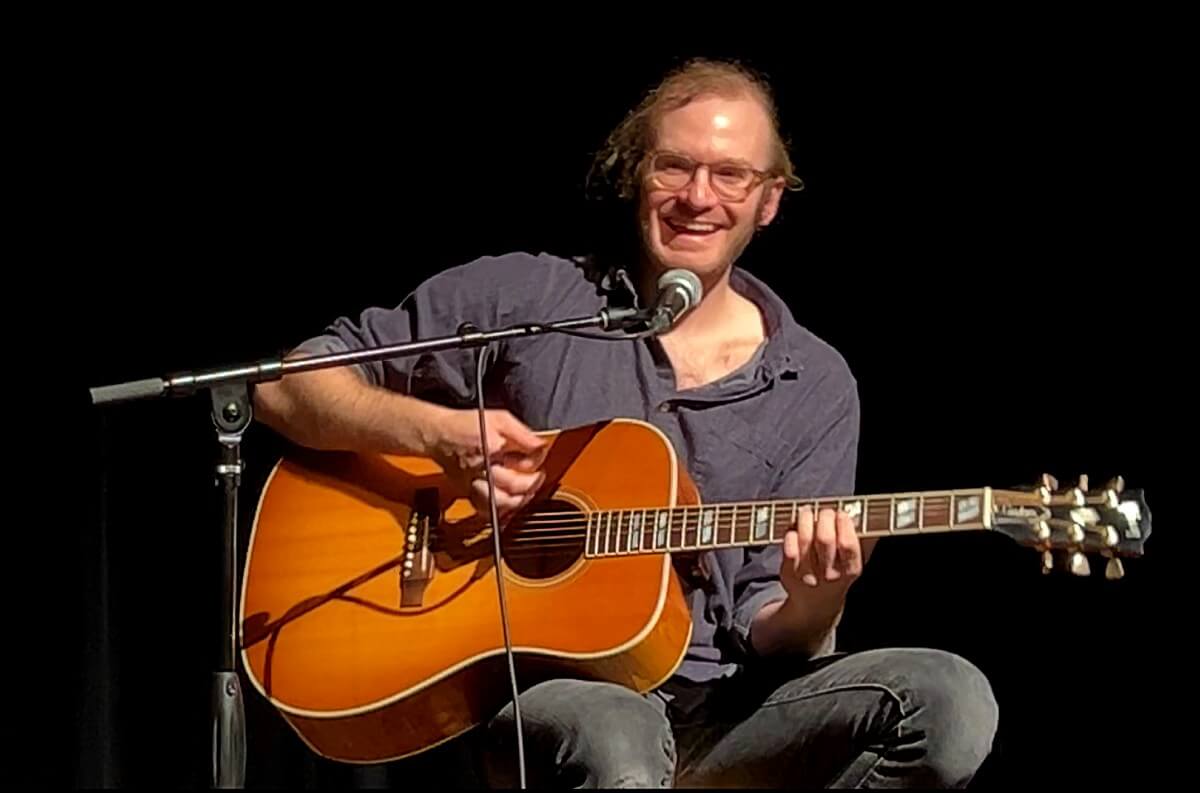Jason Paton talks Thirst Gap, Neil Young & writing music for podcasts
Thirst Gap is a six-part podcast series about how people along the Colorado River in the Southwest are adapting to water shortages as climate change causes the region to warm up and dry out. The series is created and hosted by KUNC managing editor and reporter Luke Runyon.
At the start of every Thirst Gap episode is a short piece of music that sets the tone for the podcast. We wanted to know more about this music, and the songwriter behind it, so we sat down recently with Boulder, Colo. singer-songwriter Jason Paton (Little Trips, South of France). Paton composed and performed the theme song in collaboration with drummer/bassist Forrest Raup (Pink Fuzz, Little Trips) and guitarist Hunter Stone (Famous Men, Rolling Harvest).
During our conversation, which took place at eTown Hall in Boulder, Paton talked about how he came to connect with host Luke Runyon, his inspiration for the composition, his creative process, why composing music for podcasts isn’t hugely different for him than songwriting, and how he found his way into the world of podcasts in the first place.
The Colorado Sound: Tell us about the theme song.
Jason Paton: This is the theme song that plays under the introduction to the Thirst Gap podcast. It airs in every episode, where you have the host introduce himself and the topic of the show. We just call it “Thirst Gap Theme,” which is probably the least creative name we could have come up with, but that’s all it is.
And what can you tell us about Thirst Gap?
Thirst Gap is a podcast that’s about water conservation. It’s hosted by Luke Runyon, who went on a really interesting trip up and down the Colorado River, talking to people who chiefly are affected by the dwindling supply of water in the river itself. It’s mostly about the people and their stories and how their lives are all changing – and also about people who have been left out of the conversation, indigenous people who have not historically been given water rights, and hopefully what’s being done to change that.
Related: Listen to all six episodes of Thirst Gap
Luke reached out to you to create the music. Can you tell us the story of how that happened?
He reached out because I had done the theme for a different KUNC show last year called the Colorado Dream, which is about immigrants coming into [Colorado] and their stories. And I think that they were happy with [that theme], so Luke invited me back to do another one.
And this one was a very different tone. Luke wanted something western without being cheesy and spooky, but also dramatic – and something that conveyed the complexity of the situation without just being dirgy, because it’s a dark topic. It’s a complicated topic, but if you just got too far into that, I don’t think it would do it any favors. We tried to get something that balances a little bit of the humor of the podcast with a bit of the real truths that are laid out within it.
Can you pull back the curtain on this process for us and share any inspiration you had for the song.
Tonally the inspiration that was thrown out was [HBO series] True Detective, if you’re familiar with that show. I, myself, was not familiar with it, actually. But I listened to some of the tunes, and they were super cool. That was a jumping off point.
As far as inspiration for this song itself, there’s one chord that always sticks out to me when it comes to this more western-influenced style. And it’s a minor nine, just to give away the secret. But it’s a favorite of mine that I learned from a Neil Young tune called “On the Beach.” Neil Young, also interestingly, is well known for his conservation views and his stubborn stances on saving the environment. So it seemed like an appropriate influence on something like this.
“Thirst Gap Theme” starts out with this contemplative A minor chord that you would recognize from that tune. And then my good friend Hunter Stone, he’s noodling on a nylon-string guitar in-between these to give that little bit of tension and build. Because when you’re doing these podcast songs, it’s always helpful when you’re transitioning to the theme. The tone is always presenting the problem the episode’s going to dig into and how they’re going to overcome it, what the mystery is, and you’re building up some of that tension. So you’ve got [that feeling of] ‘you’ll be amazed at what happens next.’ And here’s the episode, it’s coming at you. And then Luke finally finishes his intro, and we transition.
Of course, over that middle bit where it gets a little bit simpler, you’re leaving space for that vocal to come in when he’s saying, “For KUNC, this is Thirst Gap: Learning to live with less on the Colorado River.” Nice little closing thing to bookend it the way you started. And then we transition usually into some vibrant sound design, whether he’s standing at the top of Hoover Dam. or he’s in a canyon overlooking the Colorado River, or wherever it might be. And that’s how the shows all begin.
What kind of feedback are you getting?
The podcast is definitely getting a lot of listens, but people don’t tend to focus on the song itself. The song is just a bed for someone to talk over. Hopefully it raises the hairs on your arms a little bit, and you’re more intrigued about what’s to come in the episode, but the focus is on what the host is saying. I haven’t heard anyone say anything about the song itself, but I’m super proud of it.
Tell us about collaborating on the track with Hunter and Forrest.
What I love about music is playing with other people. So doing that theme with Hunter and Forrest was a blast. I picked Forrest because he’s one of the best drummers in Colorado. He plays with his band Pink Fuzz. Hunter Stone I picked because he’s the perfect tone for what we were looking for. He’s got songs literally about conservation, and he’s a big outdoorsy guy and he knew exactly what we needed. The minute we started strumming A minor, he was already just going to town, [adding] that cool nylon sound that gives it that almost spaghetti western vibe.
Is it hard to switch gears from being a musician to working on podcasts?
It’s not all that different to me. When I’m sound-designing work, I approach it the same way I would work on producing a song. It’s just that the lead vocal on a podcast is spoken word, as opposed to being more melodic.
My day job is doing podcasts in general, and I have composed for some other shows. But this is the real treat is when I get to do this.
One of my other big projects is composing for Out Alive, a podcast by Backpacker magazine. And then I make a million other podcasts that don’t have my music on it, but I do the sound design and audio editing and mixing and stuff for that. Those podcasts include Guardians of the River, which won the [Nonfiction Narrative Award] the first time that the Tribeca Film Festival accepted podcasts. I was the sound designer on that project.

How did you get into working on podcasts?
I went to school for audio radio production. I experienced working in commercial radio and found that I much preferred noncommercial and public radio. And my first serious big boy job after moving out to Colorado was working with a company called House of Pod, which was focused on making podcasts and telling the stories of people who were traditionally left out of the story.
I guess [audiobooks were] the real entry into it. I had started out reading audiobooks when I first graduated, just desperately trying to make rent money, and it was a lot harder than I thought. It’s not just reading a book from one end to the other. So I guess I transitioned to podcasts quickly because half-hour podcast versus a 15-hour book…the math is pretty simple on that one. I love podcasting, though. It breaks a lot of the traditional rules of media.
You can have highly produced sound design podcasts like Thirst Gap. And then you can have lovely podcasts that are just people sitting around and talking. One of my favorites is Behind the Bastards, telling the story of some of the worst people in history.
I just love that podcasting is the rock and roll of audio.
All six episodes of Thirst Gap can be heard on KUNC.org or anywhere you get your podcasts.
Luke Runyon will speak at a live Thirst Gap event on Wednesday, May 24 at the Lincoln Center in Fort Collins.
Thanks to eTown Hall for letting us use their space for this interview.
Jason Paton’s band Little Trips performs Thursday, May 25 at the Hi-Dive in Denver.
Related pages:
The Colorado Sound Music Awards – meet the 2023 winners
Top 850 Cover Songs – see the complete list of songs based on your votes
Soundboard Newsletter – subscribe to get music news, presale codes, other goodies every Thursday morning
Become a Colorado Sound member – join our awesome community of passionate music lovers
Instagram – follow us on Instagram for fun Stories, Reels, and posts

